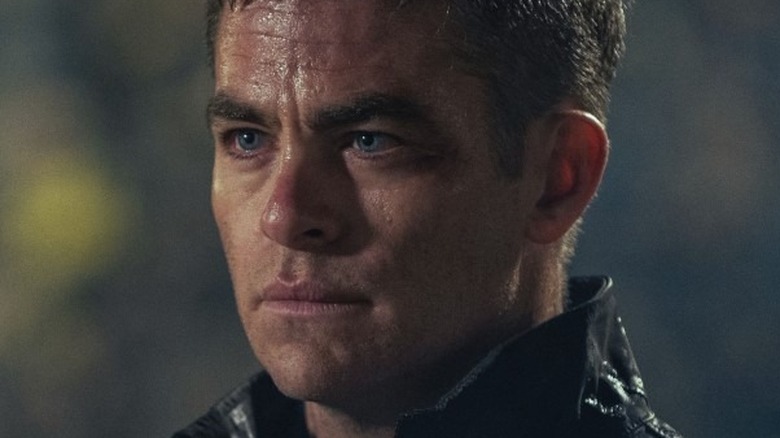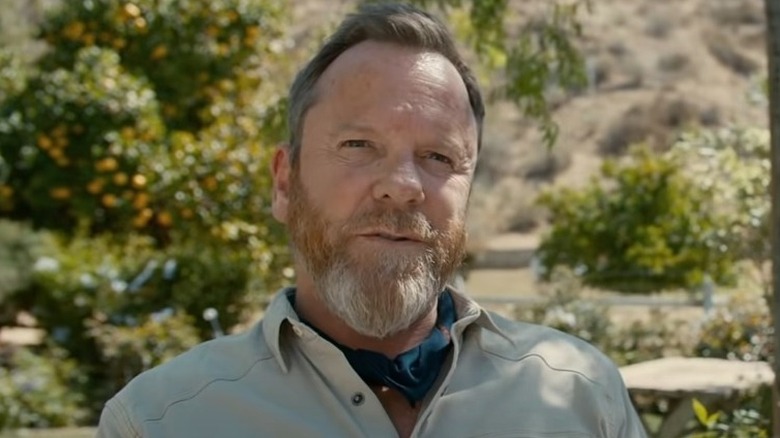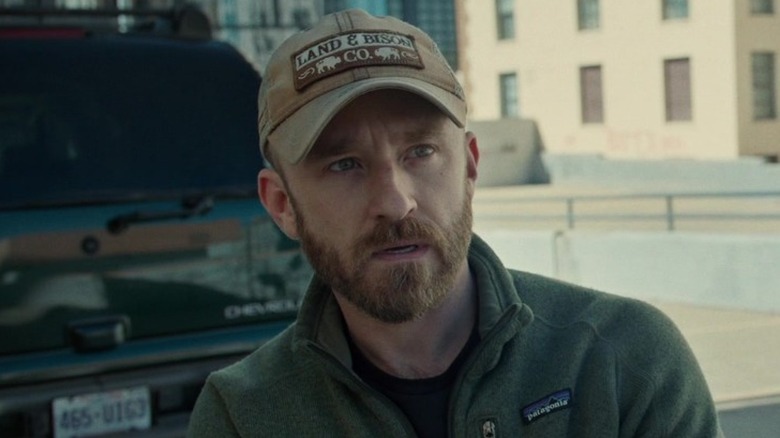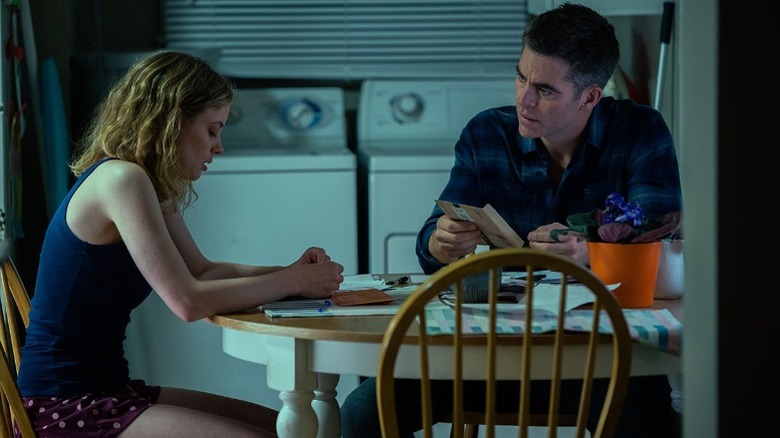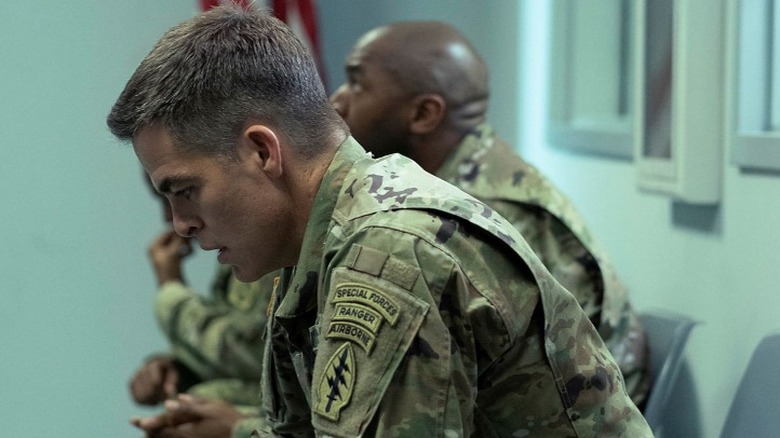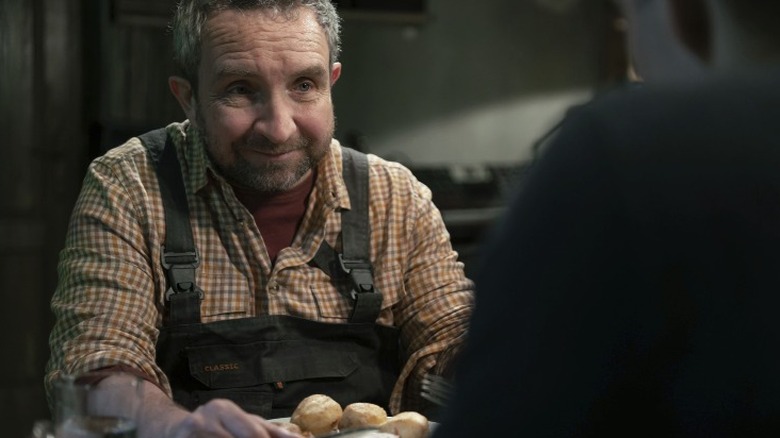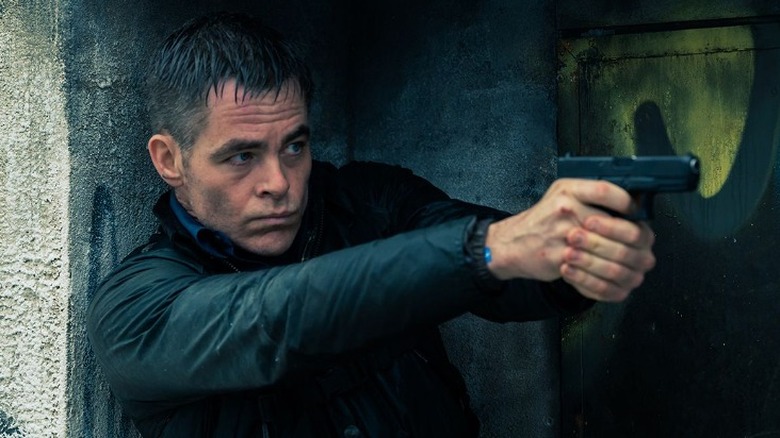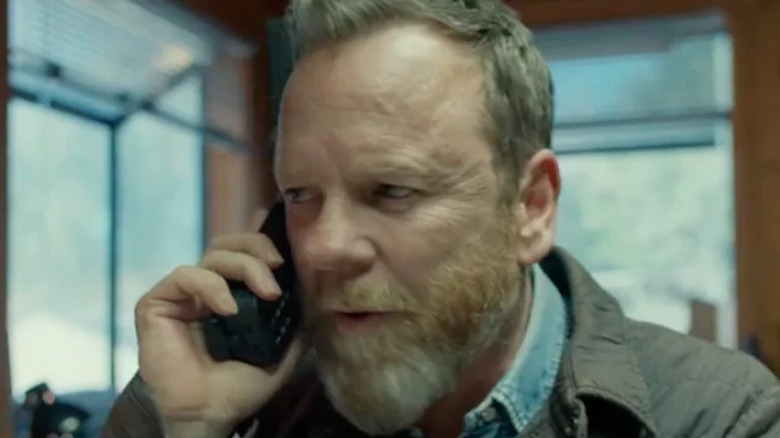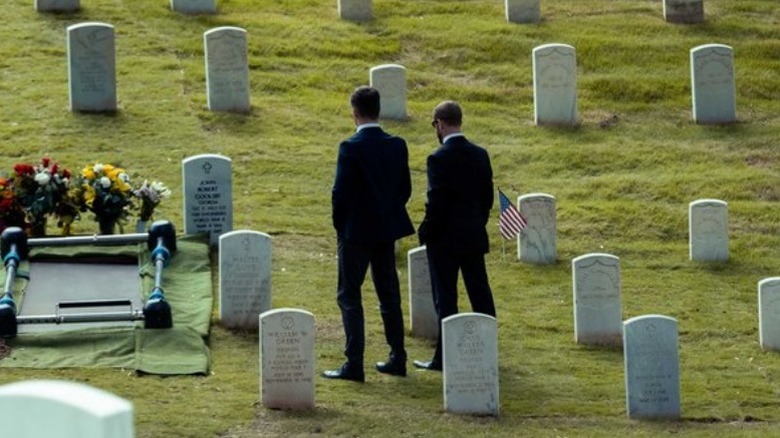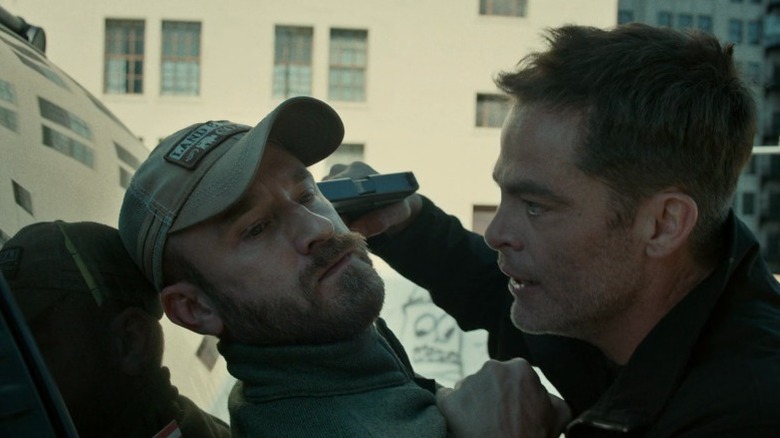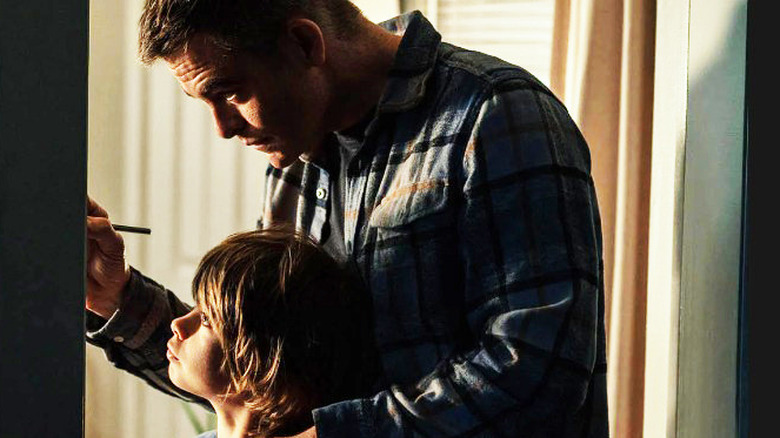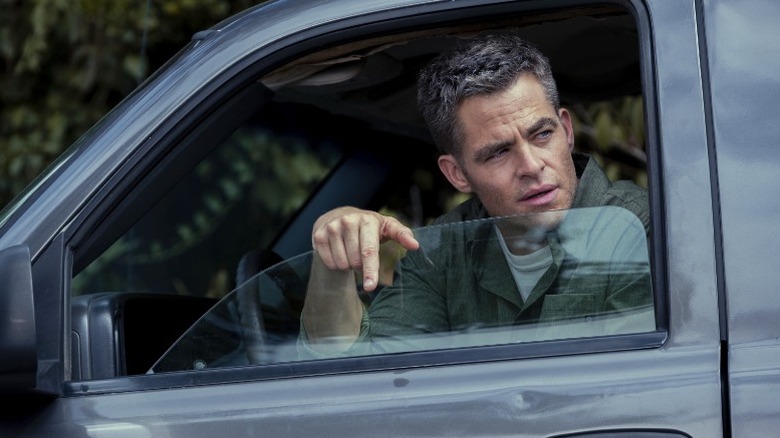The Ending Of The Contractor Explained
Chris Pine's casting in "The Contractor" is almost stunt-casting. In sweeping and dashing heroic roles like Steve Trevor in the Wonder Woman movies, as well as Captain James T. Kirk in the modern "Star Trek" films, Pine has been every bit the glamorous, all-American hero that other famous Chrises play in the Marvel Cinematic Universe (he even memorably poked fun at Hemsworth, Evans, and Pratt in an "SNL" monologue). But in "The Contractor," director Tarik Saleh puts Pine through the wringer. In a thoroughly beleaguered, un-glamorous performance Pine plays James Harper, a desperate former soldier that turns to the shadowy and morally dubious world of private contracting as a mercenary.
In an exclusive interview with Looper, Pine called "The Contractor" "a really complex little Rubik's Cube of a script" that appears simple at first glance. The movie attempts to satisfy as an intrigue-laced thriller in the vein of the "Bourne" franchise, but also functions as a message movie that calls attention to the personal difficulties that servicemembers face as well as the moral and legal grey area that results from privatizing a significant portion of our national security. As a result, "The Contractor" is a little hazy and hard to follow since it cares a bit more about emotional texture than resolving every detail of the plot. Let's read between what lines the movie gives us and fill in some blanks. This is the ending of "The Contractor" explained.
Who are we working for?
As if to one-up the casting of Chris Pine as our sullen but noble hero James Harper, "The Contractor" ups the ante by nabbing Kiefer Sutherland for the pivotal role of Rusty. The big twist in the movie is, of course, that Rusty is not the benevolent overlord that he seems: not only is the mission in Berlin that he sends James and Mike (Ben Foster) on much more than "information gathering," he's willing to have James killed when it all goes south. In short, Rusty's company is being paid by nefarious unknown forces to prevent a vaccine for the H5N1 flu from being released. He's had James essentially assassinate an innocent scientist working toward a cure by telling him he was an Al-Quaeda sympathizer developing a weapon.
"The Contractor" doesn't bother to say who hired Rusty: pharmaceutical companies? A rival government or sectarian group that actually developed H5N1? In any case, it's not national security, and James and Mike head to Rusty's ranch for a showdown once they realize how expendable they are. Simply by having the star of "24" (where he played fictional America CTU legend Jack Bauer), turn out to be the villain "The Contractor" makes a strong case as one of the best war movies of the year.
I didn't die in my sleep
Pour one out for Mike, who unfortunately dies after getting shot by Rusty in the final shoot-out. The most compelling emotional journey of "The Contractor" is the roller coaster of trying to guess where Mike's loyalties lie. He was James's commanding officer when they served together, and doesn't seem like he would recruit him into anything that bad. But when he's revealed to be alive and well after Rusty claimed Mike never made it out of Berlin, James has to assume he can't trust his best friend. We're happy to assume along in the audience, especially since Ben Foster is well known for playing loose-cannon characters in action movies like the moody Western "3:10 to Yuma," or in his earlier team-up with Chris Pine in "Hell or High Water."
When James makes it back to the states after the Berlin fiasco to confront Mike, we learn there's a middle ground: although Mike wasn't necessarily clear on their true purpose in Berlin, he clearly understood that it might not have been the noble national security mission Rusty claimed. He was also told that James died attempting to flee the city, and his loyalty to Rusty is broken after learning that James was nearly killed by his other forces. Redeemed to a degree by joining James in the assault on Rusty's compound, Mike dies a qualified hero. He may not have "died in his sleep," but he became a mercenary to provide for his family and lost himself in the process.
You said they never check
The inciting incident of "The Contractor" is when James's unit gets a new commanding officer, one that suddenly orders a drug test for steroids that James fails. In order to rehab sufficiently from a knee injury sustained in his earlier tours in Iraq and Afghanistan, James had turned to several drugs as well as HGH (human growth hormone) in desperation to stay on active duty. As he told his wife Brianne (Gillian Jacobs), they "never check" for steroids. This is actually true in real life — since steroid testing is much more expensive than regular drug screening, it isn't ordered without probable cause.
As James desultorily speculates, his new C.O. was likely just cleaning house. There's not much data available on steroid use in the military, but at least anecdotally on Quora it seems to vary widely from unit to unit. Some people report rampant usage (including rehabbing injuries), while others report a strict no-tolerance attitude more consistent with the Uniform Code of Military Justice, which bans them. James's experience hints at a military culture that's subject to inconsistent discipline and blind eyes, subject to the whims of budget constraints and intra-military political agendas. He followed the rules, broke the rules that informally he understood not to be actual rules, and is punished for pushing his own body past its natural limits.
What do you look forward to?
"The Contractor" is a quietly existential story as James and his fellow ex-servicemen are all dealing with a profound lack of purpose and identity. As they reckon with the recent suicide of another member of their old unit, James even essentially asks Mike what reasons he has to get out of bed in the morning, to keep living. According to data from the U.S. Department of Veterans Affairs, veterans are more than twice as likely as a member of the general population to take their own life.
Mike's answer to this question, and essentially the movie's answer as well, is that ensuring the safety and future of your family is the best guiding light available. Mike's turned to contract work to provide for his special-needs son, and even the doomed scientist Salim (Fares Fares) promises his own son he was working toward a better future for his sake, in a pre-recorded video. James is at a loss in life without the military, but his desire to make a life for Brianne and little Jack (Sander Thomas) is purpose enough, at least in the short term.
If you or anyone you know is having suicidal thoughts, please call the National Suicide Prevention Lifeline by dialing 988 or by calling 1-800-273-TALK (8255).
Virgil's safe house
Just when "The Contractor" is threatening to descend into ceaseless chaos of gunfire and close personal combat, a kind-hearted ex-Marine named Virgil (Eddie Marsan) shows up to provide James with a convenient safe house outside of Berlin. James makes a leap of faith, as he was given the number and passcode for Virgil's services from a dying ex-Marine that was one of Rusty's goons attempting to kill him, but it pays off huge as Virgil provides pickup service (although he does tranquilize you), free medical treatment for James' knee, and even a decent meal.
Marsan picks the movie up with a bit of warmth and humanity amid the gunplay in one of the better one-scene performances in any movie recently. Without a real gift from a man that he killed, James wouldn't have made it much longer in Berlin without a chance to recuperate or rest. In keeping with "The Contractor" and its bleak tone, Virgil's kindness is rewarded with a bullet to the head as Rusty's forces find them out within a day's time. When James gets the drop on his latest round of mercenary pursuers and blows them up, the feeling of immediate vengeance on Virgil's behalf is the most satisfying moment in a film without many clear small victories.
When I reach out, I break things
James' discussion with Virgil, although it's cut tragically short, is "The Contractor" at its most hopeful and humane. Virgil puts it to words eloquently when he sums up the reasons he's not in contact with his family: "When I reach out, I break things." Beyond the general struggle to redefine themselves and keep going, former members of the military face a host of challenges. According to a study in "Advances in Medical Education and Practice," U.S. veterans face an increased risk of post-traumatic stress disorder, depression, chronic pain, substance abuse, homelessness, and more.
Virgil may not be with his family, but he at least acknowledges the breath of what veterans face in attempting to readjust. In James' community at home, it all goes unspoken until it reaches a crisis point. When Brianne comes home to find James working on the roof in the middle of the night, it's an example of the exact sort of pathological behavior that Virgil was getting at. Without getting polemical or biting off more than it can chew philosophically, "The Contractor" shows us the costs of molding men into weapons of war in the grimaces, weary silence, and thousand-yard stares of its leading men.
Direct presidential authority under Title 50
Nothing makes something sound official like citing regulations or codes. Rusty makes his whole operation sound very legitimate in one fell swoop by claiming that they operate with full presidential authority under Title 50 of the U.S. Code. It sounds plausible enough, by the numbers: in 2020 The Washington Post reported that in the Middle East alone the previous year, contractors outnumbered actual military servicemembers 53,000 to 35,000. According to the Department of Defense themselves, $439.4 billion dollars was spent on "contracted products or services" in 2020, an operation like Rusty's could easily have $50,000 laying around to advance James as a gesture of good faith.
But it all turns out to be theater. The operation in Berlin (were it actually just information-gathering), would be well within the scope of the CIA itself, and Title 50. If you actually peruse chapter 15, subchapter III entitled "Accountability for Intelligence Activities," lays out how even any covert action from a government contractor must in theory be approved by the President himself, and Congress informed in writing. By the time the team is shooting wantonly at the Berlin police, it's clear that they're not operating under Title 50, or even the cartoon CIA logic of TV like "Homeland."
Let's offer up a prayer for our protectors
A quiet theme at the beginning of "The Contractor" is the ostensible failure of religion to actually provide a community for veterans. The priest who opens the movie says people are more prone to isolation than ever, and even as he offers words for soldiers in the congregation, James is clearly staring off into space and paying no attention. Church has become a rote ritual, surrounded by people that don't understand his experience. The moment when his son's "Amen" brings him back to reality is quietly heartbreaking.
"The Contractor" pulls away from this theme as James' story unfolds; it clearly has more interest in condemning the military than the church. But it's telling that despite multiple scenes of attending church in the early going, there's no larger sense of community or help for Jack and Brianne to rely on as they face sudden insolvency. Especially as the last century of warfare has become less about world wars and more about endless occupations and drone strikes with obfuscated motives, the sanctity and spiritual weight that we assign to the military has perhaps changed with the times.
We're all just mercenaries in the end
Rusty's pitch to James is that despite the military chewing them up and spitting them out, they can operate as contractors with honor because they "formed our own tribe." Even though the system is broken, and the realities of service are harsh and nothing like the feel-good vibes of the "Top Gun" movies, Rusty offers community and order within the confines of his private outfit. Even in the convivial, rustic setting of his ranch Rusty is set up to represent the sense of belonging that James is desperate for.
"The Contractor" takes a dimmer view, one that aligns more with Mike's offhand comment earlier in the movie: "We're all just mercenaries in the end." Without the structure, oversight, and inherent purpose of the military, Rusty, Mike, and all the other anonymous former soldiers caught up in the events of the film are lost and quickly at each other's throats. The myopic subservience of military life hasn't prepared them to see much further than looking out for themselves, best case scenario their families as well. When Mike shows up in "The Contractor," tension breaks because he's the first person that gets James to smile, or even relax. But before long, a mercenary betrayal has James holding a gun to Mike's head.
A fading tattoo and an absent father
Something that "The Contractor" establishes early on is how tender and patient James is as a father to Jack. He's genuinely supportive as he helps Jack learn to swim, and doesn't upbraid or lose patience when his son shows anxiety or fear. Later, we learn that this is in stark contrast to James's own father. His old man was a soldier that got James a painful American flag tattoo as an early birthday present and molded James to be the ultimate soldier in his own image. But after his service, facing the same demons of purposelessness and readjusting that James is now, his father disappeared without a trace and abandoned his family.
As James loses the forces that defined his life, first the military and then the brief hope that contract work would have similar clarity of purpose, he begins to focus more and more on just being a better father to Jack than his own father was to him. At many points in Berlin he could have easily given up and stopped running, with his body giving out and his resources limited, but the motivation not to abandon his own family and keep the cycle going pulled him through it all.
An abrupt cut to black
"The Contractor" has no interest in hand-holding us at its conclusion, and leaves several important questions unanswered. What kind of future is James looking at? What kind of questions will the police have about Mike's body being found in his car? Is there a paper trail of any sort that ties him and Mike to Rusty's operation? James's legal situation in the U.S. seems tenuous even if the entire scope of what went down was off the books — at the very least, there's a $50,000 check to explain. And if any evidence of Rusty's "national security" operation is uncovered in Berlin, James would become an international fugitive.
Does he take his family on the run? The moral quandary of choosing between abandoning Brianne and Jack (like his own father) in order to protect them versus turning the whole family into fugitives would have been an interesting one, right in line with the rest of the ideas "The Contractor" explores. But instead, it ends abruptly at the moment that James calls out to his family, hinting at a sort of saccharine happy ending that feels a bit out of step with the rest of the movie.
